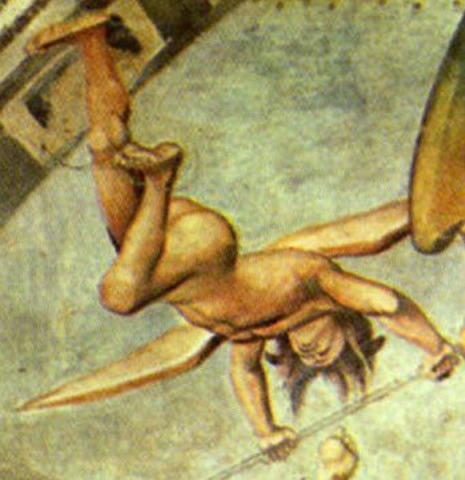
The Underground Thomist
Blog
A Dialogue on Natural Law, Part 1of 10Tuesday, 05-12-2015
You natural law thinkers seem to be confused about whether natural law comes from God, from nature, from conscience, or from reason. There is no confusion, only a distinction. Traditionally, the authority of natural law has been found in the Creator, its content in the design He imparted to us, and the power by which we recognize it in the faculty of reason -- which is also a part of the design, and which includes deep conscience as an element. In the older natural law terminology, the first is called the "binding norm," the second the "discriminating norm," and the third the "manifesting norm." Even so, to say that something is right just because it is natural is to commit the fallacy of deriving an "ought" from an "is." No such fallacy has been committed. An "is" which merely "happens to be" has no moral significance because it is arbitrary; that's why it cannot imply an "ought." But an "is" which expresses the purposes of the Creator is fraught with an "ought" already. Such are the inbuilt features of our design, including the design of deep conscience. I notice that you've already dropped the language of the three norms. If it helps, I'll use it again. Put technically, your complaint confuses the discriminating norm with the binding norm. It treats nature as providing not only the content of the natural law but its authority. Natural law thinkers don't do that. I'm still uncomfortable with this business about "nature" and the "natural." Didn't Aristotle and many others claim that even slavery was natural? Yes, but they were wrong. It isn't. Isn't that a bit glib? Not at all. Slavery is about one being using another being merely as a means to its ends. A what may use a what, as a spider may eat a fly. A who may also use a what, as a man may eat a potato. But a who may not use a who -- and human beings are whos. The fact that we are whos, not whats, is a feature of our design, and its significance is recognized by deep conscience, which is another feature of our design. Not even God merely uses us, because He would not dishonor His image. Slavery was not my point. What I meant was that many grave moral wrongs have been committed in the name of natural law. Of course. In the name of every good evil has been done; in the name of every truth lies have been propounded. That is how sin works. Having nothing in itself by which to convince, on what other resources but good and truth can it draw to make itself attractive and plausible? We must use the natural law to recognize the abuse of the natural law; there is nothing else to use. You still don't understand me. All sorts of wrongs are natural. It's natural to fly into a rage. It's natural to murder. Don't you get it? You're mixing up two different senses of the word "natural." People do fly into rages and do murder, but the question is how we are designed. We are designed with a capacity for anger, to arouse us to the protection of endangered goods. That purpose is also an aspect of the design, so it doesn't follow that anger should be indulged to such a point that goods are endangered. Aren't we also provided with brakes? But we violate nature every time we have a cavity filled! Isn't it natural for human beings to transcend their natures? Saying that we violate the nature of a tooth every time we fill a cavity is like saying that we violate the nature of an automobile every time we plug a leak in the radiator. When we plug the leak, we are fulfilling the design by putting the car back in proper order. In the same way, filling a cavity restores to the tooth its natural function of chewing. Healing does not transcend our nature; it respects it. So you would say that aspirin, surgery to remove a tumor, and cloning "respect" nature, too. Not cloning. Why not? Doesn't it assist the natural function of having babies? Once more: Our nature is our design. We are designed to have babies, but we are not designed to have them in that way. To put it another way, our design includes not only certain ends but certain means. There is a difference between repairing the reproductive system and bypassing it. Well, it doesn't seem to be a big deal anyway. I think it is a very big deal. When you try to turn yourself into a different kind of being, you are not only doing wrong but asking for trouble. He who ignores the witness of his design will have to face the witness of natural consequences. A Dialogue on Natural Law, Part 2 |
Why Is It So Easy?Monday, 05-11-2015
Mondays are reserved for the perplexities of students. Question: If the most general principles of the natural law are at some level known to everyone, why is it so incredibly easy to disobey them? Reply: You’re onto something: Conscience tells everyone the wrong of cheating, the right of marital fidelity, the wrong of injustice – yet there is cheating, unfaithfulness, and injustice. It’s no good to pretend that we are naturally doers of evil, for isn’t conscience part of human nature too? But our hearts are divided against themselves. The law is still written on them, but we try to cover up the inscription. What is going on? I don’t think secular writers have a good answer to your question. In the Christian tradition, the answer is that although the natural law tells us the true conditions of human flourishing, we demand to have happiness on terms that make happiness impossible. This perversity has a history: From earliest times, we have wanted to be gods instead of images of God. Why should that make a difference? Because we weren’t made to function properly without Him, and He is our ultimate good. Trying to be our own gods has natural consequences, just as surely as trying to eat sand instead of food. What consequences? One is that when the mind declares independence from its maker, the passions and desires declare independence so to speak from the mind. They seem to have a mind of their own; they resist the rational direction with which they are meant to cooperate, as though the horse wanted to ride the man instead of being ridden by him. Another is that we begin lying to ourselves, trying to convince ourselves that we don’t know what we really do know, and that our wrongs are really right. Because we are rational beings, bad reasoning takes on a life of its own and drives us into further wrong acts. So what happens to conscience? It’s still working, but we have to remember that conscience has more than one mode of operation. In the cautionary mode, it alerts us to the peril of moral wrong and generates an inhibition against committing it. In the accusatory mode, it indicts us for wrong we have already done. In the avenging mode, it punishes the soul who does wrong but who refuses to read the indictment. Although many writers have tried to explain concience away, none of these efforts have succeeded. Conscience is just what it presents itself as being: An interior witness to a real law. I’ve written about some of this in an article called “The Revenge of Conscience” and a blog post called “What Conscience Isn’t.” If you’d like to know more, you can dig up my book What We Can’t Not Know: A Guide.
Tomorrow: A Dialogue on Natural Law, Part 1of 10 (and no, it won't run every single day!)
|
Déjà Vu, Part 2 of 2Sunday, 05-10-2015
I commented yesterday that widespread cultural adjustment to nihilism has happened before, for Buddhism is the nihilism of the East. Western nihilism is different. We don’t follow the Noble Eightfold Path, because we no longer admire anything noble. Despite a few superman pretensions, ours is a nihilism for the vulgar. Macho nihilists say "Maybe there isn't any meaning, but I'm brave enough to live without it. Whatever doesn’t kill me makes me stronger." That is just a pose. They can't really live without meaning -- they seek it in the idea of living bravely. The problem is that they haven't anything to be brave about. Pop nihilists say "Meaning is a drag -- who needs it? I'm so cool I like life pointless." That is another pose. They don't really like life pointless -- they seek meaning in seeming to like it pointless, in being cool. The problem is that in a pointless life, being cool is as pointless as everything else. Political nihilists say "If I need a meaning, my group will construct it for me. Whatever we say is true, that's true for us. And when we win, it will be true for you too." The problem is that there is no such thing as "true for us." If the group said rape were okay, that fertility were a disease, or that a man and his dog were married, these things would still all be false. We can't change reality by changing the way we talk. We can only pretend to. Most real-life nihilists are a mix of the three flavors: a little Macho, a dash of Pop, and a sprinkling of Politics. Some few of them wear the nihilist label proudly. Others downplay their nihilism -- they don’t want to be extremists. But meaninglessness is the point of nihilism; there isn't much you can do to moderate it. Tomorrow: Why Is It So Easy?
|
Déjà Vu, Part 1 of 2Saturday, 05-09-2015
Nihilism is the belief that everything is meaningless. Usually this belief is coupled with the view that nothing we perceive is even real – that the world is a mocking veil of illusion. One would think this error would be confined to a few despairing intellectuals, but in our day it infects even the general culture. This raises a question: Can one adjust to nihilism? Can one become resigned to meaninglessness? In one sense, yes, adjustment is certainly possible – in fact, it has happened before. The ancient Eastern adjustment to nihilism is Buddhism. According to Buddhism, the great problem of life is suffering; the great cause of suffering is desire; and the great origin of desire is the illusion of personal existence. For suffering to end, desire must end. For desire to end, the illusion must end. To attain nirvana is to be annihilated, nothing more and nothing less. Expressions like “tranquility” and “bliss” are misleading, because such terms designate experience, and the illusion of experience has been obliterated. The futile chase for meaning has finally ended. But in another sense, no, adjustment is impossible. For if my very existence is an illusion, then what difference does make that I am suffering? There is no need to seek annihilation, since I am not really here in the first place. So if I do seek annihilation, then plainly I am not adjusted to meaninglessness. I am merely trying to find meaning in the thought of an adjustment to meaninglessness. Tomorrow: Déjà Vu, Part 2 of 2
|
Living Like an AnimalFriday, 05-08-2015
A good high school graduation present To “live like an animal” isn’t really to live like an animal, but only to live as a human badly. For although we too have animal powers, we do not, we cannot, experience our animal powers as animals do -- nor would it be good for us if we could. For us, every impulse is mediated and modified by mind; the notion of a “raw feel” is a dissipated fantasy. Ideally, the mind acquires wisdom; ideally, the lower powers acquire discipline. Then, rather than champing at the bit, they are taken into partnership with reason. Like salt dissolved in water, they remain themselves, and yet they are drawn out of themselves -- held in solution by a flood of rational meaning. Animals feed; we share meals. Animals mate; we marry. Animals flock; we practice friendship. Tomorrow: Déjà Vu, Part 1 of 2
|
Paradoxical DignityThursday, 05-07-2015
Some people dispute the classification of man as a rational creature because we abuse our rational powers. What they overlook is that when we have bad reasons, even then we have reasons; when we obstinately choose to rationalize the unreasonable, even then we engage in reasoning. Such is our paradoxical dignity, even in the way that we sin. We are but little lower than the angels, some of whom fell, as did we. Tomorrow: Living Like an Animal
|
MisfiresWednesday, 05-06-2015
To say that animals have natural inclinations is not to say that animals never behave inappropriately, as when one male animal attempts to mount another. Rather it means that the creational design provides a standard for considering the behavior unfitting. In such a case, what nature provides to draw males and females together has misfired. The fact that the creature may become habituated to such behavior leaves this judgment untouched; even things that are bad for us can become “second nature.” It is easy to see how misfires can happen among subrational animals. During breeding season, the territorial defense response of the male stickleback fish is triggered by the sight of red, because competing male sticklebacks have red bellies. But the male stickleback attacks anything red, not just other fish, because it is incapable of understanding its ends. Among human beings, the etiology of misfires is much more complex because we have rational souls. Even though we are capable of grasping our ends, we may misunderstand them -- sometimes willfully. Tomorrow: Paradoxical Dignity
|






